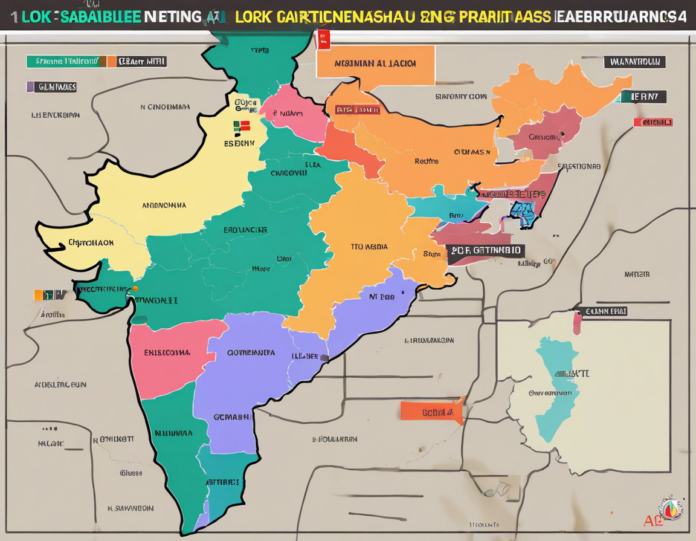As the Lok Sabha Elections 2024 progress through their various phases, the excitement and anticipation among the public only seem to grow. Phase 4 of the elections is crucial as it will see numerous constituencies across different regions of India casting their votes to determine the future governance of the country. From key battleground states to a diverse range of constituencies, Phase 4 promises to be a significant turning point in the electoral process. Let’s delve into some of the key aspects and updates of Lok Sabha Elections 2024 Phase 4.
Key Contests in Phase 4:
Phase 4 comprises constituencies from states like Maharashtra, West Bengal, Madhya Pradesh, Rajasthan, and others, making it a crucial stage in the electoral landscape. Several key contests to watch out for include Mumbai North, Kolkata North, Indore, Jaipur Rural, and Gaya, among others. These constituencies have historically seen closely fought battles between various political parties, often being the deciders in overall election outcomes.
Electoral Turnout and Trends:
One of the key factors to observe in Phase 4 is the voter turnout across different regions. High voter turnout typically indicates active public participation and interest in the electoral process. Moreover, analyzing trends in voter demographics, such as age groups and gender distribution, can provide valuable insights into the changing dynamics of Indian politics.
Impact of Regional Parties:
Phase 4 will witness the role of regional parties in influencing the electoral landscape. In states like West Bengal and Maharashtra, regional parties hold significant sway over certain constituencies, often playing a crucial role in deciding the final outcome. Understanding the strategies and alliances of these parties can provide a deeper understanding of the political dynamics at play.
Emerging Issues and Campaign Strategies:
As Phase 4 progresses, key issues and campaign strategies employed by various political parties come to the forefront. From development agendas to pressing societal concerns, each party articulates its vision for the future of the country. Analyzing the resonance of these issues with the electorate and the effectiveness of campaign strategies can offer valuable insights into voter preferences.
Social Media and Digital Influence:
In an age dominated by technology and social media, the role of digital platforms in influencing voter perceptions cannot be underestimated. Phase 4 of the Lok Sabha Elections will see an increased emphasis on digital campaigning, with parties leveraging social media channels to reach out to voters and shape public opinion. Monitoring the digital footprint of political campaigns can reveal interesting patterns and trends.
International Observers and Media Coverage:
The Lok Sabha Elections 2024 have garnered attention not only within India but also on the global stage. International observers and media outlets closely monitor the electoral process, evaluating the fairness and transparency of the elections. Their analyses and reports provide a broader perspective on Indian democracy and its functioning.
Counting Day and Result Analysis:
As Phase 4 concludes, all eyes will be on the counting day when the fate of candidates in the contested constituencies will be decided. The culmination of Phase 4 will mark a significant milestone in the electoral journey, paving the way for result analysis and understanding the overall trends that emerge from the voting patterns and outcomes.
Conclusion:
Phase 4 of the Lok Sabha Elections 2024 signifies a pivotal moment in the democratic exercise of India. With diverse constituencies, key contests, and emerging issues, this phase encapsulates the complex tapestry of Indian politics. By closely observing the electoral dynamics, voter turnout trends, campaign strategies, and media coverage, one can gain a comprehensive understanding of the evolving political landscape in the country.
FAQs:
Q: How many constituencies are going to polls in Phase 4 of the Lok Sabha Elections 2024?
A: Phase 4 includes constituencies from multiple states, with a varying number of seats going to polls based on their electoral schedule.
Q: What are some key battleground states in Phase 4?
A: States like Maharashtra, West Bengal, Madhya Pradesh, Rajasthan, and others have constituencies that are considered key battlegrounds in Phase 4.
Q: How important is voter turnout in determining election outcomes?
A: Voter turnout plays a crucial role in indicating public participation and interest in the electoral process, often influencing the final election results.
Q: How do regional parties impact Phase 4 of the elections?
A: Regional parties hold significant influence in certain constituencies and states, impacting electoral outcomes and alliances.
Q: What role does social media play in Phase 4 campaigning?
A: Social media has a crucial role in shaping voter perceptions and reaching out to the electorate, with parties focusing on digital campaigning strategies.
Q: How are international observers involved in the Lok Sabha Elections 2024?
A: International observers monitor the electoral process in India, evaluating the fairness and transparency of the elections and offering their insights.
Q: When is the counting day for Phase 4 of the Lok Sabha Elections 2024?
A: The counting day, when the results for Phase 4 will be declared, typically follows the polling phase by a few days, as per the election schedule.
Q: What are the key issues being discussed in Phase 4 campaigns?
A: Parties are focusing on a range of issues such as development, governance, social welfare, and regional concerns in their Phase 4 campaigns.
Q: How can voters stay informed about the updates and results of Phase 4?
A: Voters can follow news outlets, election commission updates, and official party channels to stay informed about Phase 4 updates and election results.
Q: What happens after Phase 4 of the Lok Sabha Elections 2024?
A: Following Phase 4, the electoral process continues with subsequent phases until all constituencies have voted, leading to the final result declaration and government formation.












